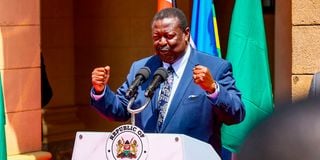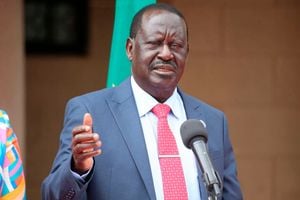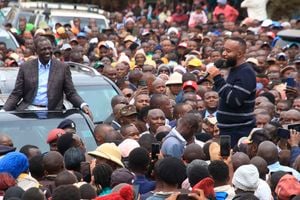
Prime Cabinet Secretary and CS for Foreign and Diaspora Affairs Musalia Mudavadi.
Kenya’s President William Ruto appears to have succeeded in temporarily quelling the anger from recent Gen-Z protests by roping in a team of rivals from the opposition Orange Democratic Movement party (ODM).
Now, top government officials are marketing the new arrangement to foreign allies, portraying it as a sign of a mature democracy and stable State.
Officially, they don’t call it a coalition, and even the Raila Odinga-led ODM insists it's not officially in government, arguing, instead, that it is still playing on the opposition side. This is even as the ‘broad-based’ government, as it is now known, includes ministers drawn from the President's biggest critics in ODM.
Prime Cabinet Secretary and Cabinet Secretary for Foreign and Diaspora Affairs Musalia Mudavadi, in a communiqué, informed the diplomatic community in Nairobi of the ongoing administrative re-organisation in the broad-based structure.
“To amplify the president’s clarion call, I wish to restate that this is a moment in Kenya’s history to live up to the demands of our time and set aside partisan interests,” stated Mr Mudavadi.
The broad-based government, he argued, does not alter its structure, stressing that the independence and oversight role of Parliament remain intact.
“Equally, the fundamental pillars of multi-party democracy are preserved,” he affirmed.
Kenya's history of coalitions
It is not the first time such a "coalition" has been made. Under former President Uhuru Kenyatta, it was called a "Handshake".
In fact, coalitions in Kenya are as old as independence itself. In 1964, Kanu and Kadu merged to form a giant national party after the latter, then led by Daniel Moi, dissolved. This pattern was rekindled decades later post multi-party politics under then president Moi after the repeal of Section 2 (A).
Then came the disputed presidential polls of 2007/2008 that birthed the Grand Coalition government between then President Mwai Kibaki and Mr Odinga.
In 2018, after nullification of the 2017 presidential poll by the Supreme Court, the electoral political season ended with a Handshake that birthed the Building Bridges Initiative (BBI) to "unite Kenyans and amend the 2010 Constitution". The BBI movement eventually collapsed, however, after failing to convince Kenyans and the judicial system of its legality and necessity.
Now, years later, foes have seemingly become friends yet another marriage of convenience aimed at calming simmering political tensions arising from recent youth-led protests.
As President Ruto trials his own brand of "coalition government", he has deployed his top diplomat to explain the sudden change of stance and work with a man he called names not too long ago.
Placating envoys
Mr Mudavadi, in addressing concerns around democratic crusade, admitted that the robust democratic space Kenya enjoys has unfortunately been marred by intense political rivalry, divisions and tensions.
However, he told envoys that the new government seeks to leverage the strength of diversity to bring together people with divergent but progressive views.
“This is part of the president’s ongoing efforts to achieve greater national inclusivity, equity and social justice. The objective is to unite Kenyans,” stated the PCS.
Foreign envoys have been instrumental in calling for respect for rule of law, free speech and respect for human rights. They have jointly or individually spoken out on purported excesses, especially from security agencies.
The protests elicited complaints of police brutality and abductions, with Inspector-General of Police Japhet Koome being shown the door. His deputy (Administration Police) Noor Gabow was redeployed to the civil service and former DIG (National Police) Douglas Kanja nominated as IG.
“These re-organisations are undertaken within the constitutional provisions, including public participation...the Houses of Parliament jointly vetted the IG nominee,” said Mr Mudavadi.
He also told envoys that the president is keen to achieve gender balance by appointing a requisite number of women and men to Cabinet, including Kenya's first female Attorney-General Dorcas Oduor.







